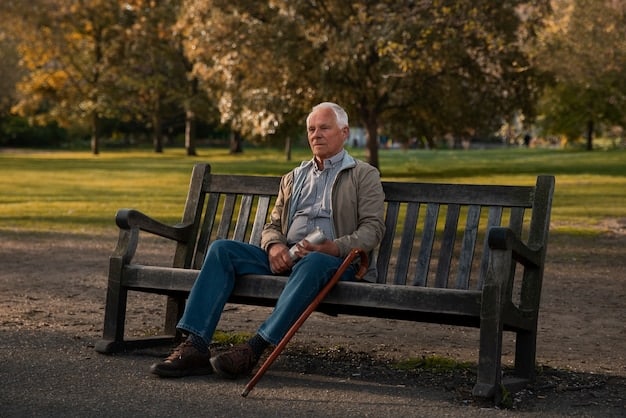Boost Longevity: How Social Connection Impacts Your Health

Social connection significantly impacts longevity by reducing stress, promoting healthier behaviors, and improving overall well-being. Stronger relationships lead to better physical and mental health outcomes, contributing to a longer, more fulfilling life.
Unlock a longer, healthier life through the power of social connection on longevity: build stronger relationships for a healthier life. Discover how meaningful bonds can significantly impact your well-being and lifespan.
Understanding the Link Between Social Connection and Longevity
Social connection is more than just having friends; it’s about the quality and depth of our relationships. But how exactly does social connection on longevity: build stronger relationships for a healthier life? Understanding this link is the first step towards harnessing its potential benefits.
Research consistently shows that individuals with strong social networks tend to live longer and healthier lives. These connections provide emotional support, reduce feelings of isolation, and encourage healthier habits.
The Role of Social Support
Social support acts as a buffer against stress and adversity. Knowing that you have people who care about you can make challenging situations feel more manageable.
Reducing Feelings of Isolation
Isolation and loneliness are detrimental to both mental and physical health. Social connections provide a sense of belonging and purpose, reducing these negative feelings.
- Improved mental health: Strong social ties are linked to lower rates of depression and anxiety.
- Enhanced physical health: Social support can boost the immune system and reduce the risk of chronic diseases.
- Increased lifespan: Studies show that people with strong social connections live longer.
Ultimately, recognizing the profound impact of social connections is crucial for promoting longevity. By actively building and maintaining meaningful relationships, we can significantly improve our overall health and well-being.

The Science Behind Social Relationships and Health
The impact of social connection on longevity: build stronger relationships for a healthier life goes beyond just feeling good. There’s solid scientific evidence that explains how social relationships directly influence our health.
From hormonal regulation to immune function, our bodies respond positively to social interaction. Let’s delve into the specific mechanisms that make these connections so vital.
Hormonal Regulation
Social interactions can influence the release of hormones like oxytocin, often called the “love hormone.” Oxytocin promotes feelings of well-being and reduces stress.
Immune Function
Studies have found that strong social connections can boost the immune system, making individuals more resistant to illness. Chronic stress, often exacerbated by isolation, can weaken the immune system.
- Lower blood pressure: Social support can help regulate blood pressure levels.
- Reduced inflammation: Social connections may reduce chronic inflammation, a key factor in many diseases.
- Improved cardiovascular health: Strong relationships are associated with a lower risk of heart disease.
Understanding the scientific basis of these benefits underscores the importance of prioritizing social connections. It’s not just about feeling connected; it’s about leveraging the powerful biological effects of social interaction for better health.
Practical Ways to Strengthen Your Social Connections
Now that we understand the importance of social connection on longevity: build stronger relationships for a healthier life, let’s explore practical ways to enhance your social life. Building and maintaining strong relationships requires effort and intention.
Here are some actionable strategies to deepen your existing bonds and create new, meaningful connections.
Join Community Groups
Participating in local clubs, organizations, or volunteer groups is a great way to meet like-minded individuals and foster new friendships. Common interest can provide a foundation for lasting connections.
Stay in Touch Regularly
Make an effort to stay in touch with friends and family. Regular phone calls, emails, or social media interactions can help maintain strong bonds, even from a distance.
Strengthening social connections might seem daunting, but starting with small, consistent actions can make a significant difference.
- Engage in shared activities: Plan outings or activities with friends and family.
- Be an active listener: Show genuine interest in the lives of others.
- Offer support: Be there for your loved ones during challenging times.
The Downside of Social Isolation: Risks and Dangers
While social connection on longevity: build stronger relationships for a healthier life is essential, social isolation poses significant risks to our well-being. Understanding these dangers can motivate us to prioritize our social lives.
From mental health issues to physical ailments, the consequences of isolation can be severe. Let’s examine some of the key risks associated with social disconnection.
Increased Risk of Mental Health Issues
Social isolation is strongly linked to depression, anxiety, and cognitive decline. Lack of social interaction can lead to feelings of loneliness, hopelessness, and worthlessness.
Higher Risk of Physical Health Problems
Studies have shown that isolated individuals are more likely to develop chronic diseases, such as heart disease, diabetes, and Alzheimer’s. Isolation can also weaken the immune system, making people more vulnerable to illness.
Being aware of these risks underscores the critical importance of nurturing our social connections. Addressing social isolation is just as important as maintaining a healthy diet and exercise routine.
- Accelerated cognitive decline: Loneliness can increase the risk of dementia and Alzheimer’s disease.
- Increased mortality rates: Social isolation is a significant predictor of early death.
- Weakened immune system: Lack of social interaction can compromise the body’s ability to fight off infections.

Building a Supportive Community: Tips and Strategies
Creating a supportive community is key to fostering social connection on longevity: build stronger relationships for a healthier life. This extends beyond having individual friendships and involves cultivating a network of people who care about each other.
Building such a community takes effort and intentionality, but the rewards are immeasurable. Let’s explore some strategies to create a strong, supportive social environment.
Foster Open Communication
Encourage honest and open communication within your social circles. Creating a safe space for people to share their thoughts and feelings can deepen trust and connection.
Participate in Group Activities
Organize regular group activities, such as potlucks, game nights, or outdoor adventures. These activities provide opportunities for bonding and create shared memories.
Fostering a strong community is an ongoing process that requires active participation and genuine care. By investing in our social networks, we create a valuable support system that enhances our overall well-being.
- Practice empathy: Show understanding and compassion towards others.
- Celebrate milestones: Acknowledge and celebrate each other’s achievements.
- Offer practical help: Be willing to lend a hand when someone is in need.
Overcoming Barriers to Social Connection
Despite knowing the importance of social connection on longevity: build stronger relationships for a healthier life, many people face barriers that make it difficult to connect with others. Recognizing and addressing these obstacles is crucial for improving social well-being.
Common barriers include time constraints, social anxiety, and geographical distance. Let’s explore some of these challenges and how to overcome them.
Time Constraints
Busy schedules can make it challenging to prioritize social interactions. However, even small, consistent efforts can make a significant difference. Schedule regular check-ins with friends and family, even if it’s just a quick phone call or text message.
Social Anxiety
Social anxiety can make it difficult to initiate and maintain social connections. Start by engaging in low-pressure social situations, such as small group gatherings or online communities.
Overcoming these barriers requires awareness and proactive strategies. By addressing these challenges, we can create more opportunities for meaningful social connection.
- Address transportation issues: Find alternative ways to stay connected if mobility is an issue.
- Join online communities: Use the internet to connect with like-minded people.
- Seek professional help: A therapist can provide strategies for managing anxiety and improving social skills.
| Key Point | Brief Description |
|---|---|
| 😊 Social Support | Acts as a buffer against stress and improves mental health. |
| 💪 Immune Boost | Strong social ties can strengthen the immune system. |
| ❤️ Cardiovascular Health | Reduces the risk of heart disease and lowers blood pressure. |
| 🧠 Cognitive Function | Helps maintain cognitive function and reduces the risk of decline. |
[Frequently Asked Questions]
▼
Social support provides a buffer against stressors. Knowing you have someone to lean on can reduce feelings of overwhelm and promote relaxation.
▼
Yes, studies show that strong social connections can enhance immune function, making you more resilient to infections and diseases by influencing hormonal balance and reducing inflammation.
▼
Simple ways include regular phone calls, joining community groups, participating in shared activities, and leveraging social media to stay in touch.
▼
Loneliness can accelerate cognitive decline and increase the risk of dementia and Alzheimer’s disease. Social interaction is crucial for maintaining cognitive function.
▼
Start by engaging in activities you enjoy, joining local groups or online communities, and being open to meeting new people. Small steps can lead to meaningful connections.
Conclusion
In conclusion, the importance of social connection on longevity: build stronger relationships for a healthier life cannot be overstated. From reducing stress to boosting immunity, the benefits of strong social ties are profound and far-reaching. By prioritizing our relationships and actively building supportive communities, we can significantly enhance our health and well-being, leading to a longer, more fulfilling life.





